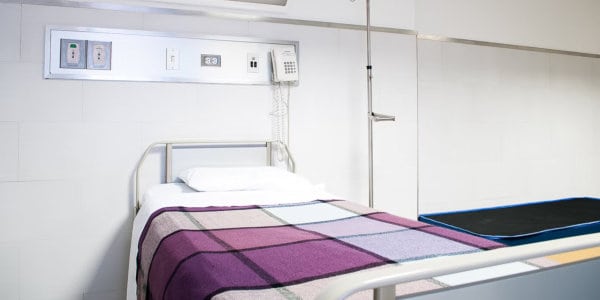“Sister Teresa,” she whispered, beckoning with her finger. “Sorry to trouble you again…” Teresa tiptoed over to her bed. Her patient seemed unnaturally alarmed. “Is something wrong, Betty?”
“No, but I’ve been thinking, and want to tell you that if I die, I hope you will come to my funeral. I have the details here, in my yellow notebook. It is so sad if there are no mourners. I was the only one at my Mom’s, and it was… desolate. If you sang ‘Be Not Afraid’ I am sure there would be a special blessing for you, and for me. I know you know the song.” Her eyes were shining.
“Hush, Betty. Try not to think of such grim possibilities. Of course I would go if this happened, but there is no reason it must. There are risks in everything we do, even when we cross the street, as you know. You are like me. We both carry within ourselves the fear of the unknown, the loneliness of our own solitary lives, the responsibilities that weigh us down from time to time, just as you have carried the risk of your aneurysm, but we do our best here to minimize the suffering and the worry. Try to rest, and I’ll see you tomorrow before they take you down.”
It was after midnight before Teresa climbed into bed knowing she would be on duty again at 7:30, so she set the alarm for 6:30, hoping the snow forecast for the next day would arrive after her bus deposited her at the hospital in time for her to see Betty as promised. The snow, wet and heavy, was fiendishly punctual, however, and the bus had made heavy weather of climbing the hill on Carling Avenue. She was almost late for work, and to her dismay, she discovered that Betty’s bed was empty, and the name board above her bed vacant. Even before she consulted the shift report, compiled every night to ensure continuity of care, she feared the worst. She saw Sandra her colleague in the hallway, who confirmed her suspicions.
“She started to deteriorate overnight, and they had to take her earlier for the procedure.
That’s all I know.” A fateful premonition began to take shape in Teresa’s mind.
Moments later, Teresa caught sight of Dr. Martin, the attending neurologist, making his rounds with several interns. As she approached him, she overheard him refer to the sudden death of her patient. Betty had been rushed to the radiology department in the small hours where, during the coiling process, the aneurysm had burst, and the resultant cerebral haemorrhage proved fatal. Teresa walked away to a quiet corner to compose herself. One of the night nurses, seeing her there, put her hand on her shoulder. “Her things, including something for you, are in a blue canvas bag at the nursing station.” Teresa nodded her thanks and with a heavy heart started her shift. It was not until lunch that she saw what Betty had left for her. Inside the yellow notebook she had referred to the evening before, Betty had left a card in an envelope. Entitled ‘A little note of thanks for a whole lot of thoughtfulness,’ it read as follows:
“Dear Sister Teresa, I can still feel that beautiful soft pillow you brought me—so fine for my earrings! Thanks for the reminder re: risks we face in life. I needed that—and your respectful care. Medical people forget sometimes they can and should always be kind to patients they have power over. No matter what a boss says, they can always help with kindness. I knew the value of caring, but never knew until now how hugely important and appreciated it is by patients. If I don’t see you before I leave, you are the most beautiful example of empathy.
Elizabeth (Betty) Feehally. (P.S. I never had a sister until I met you. Now I know I have one!)”





